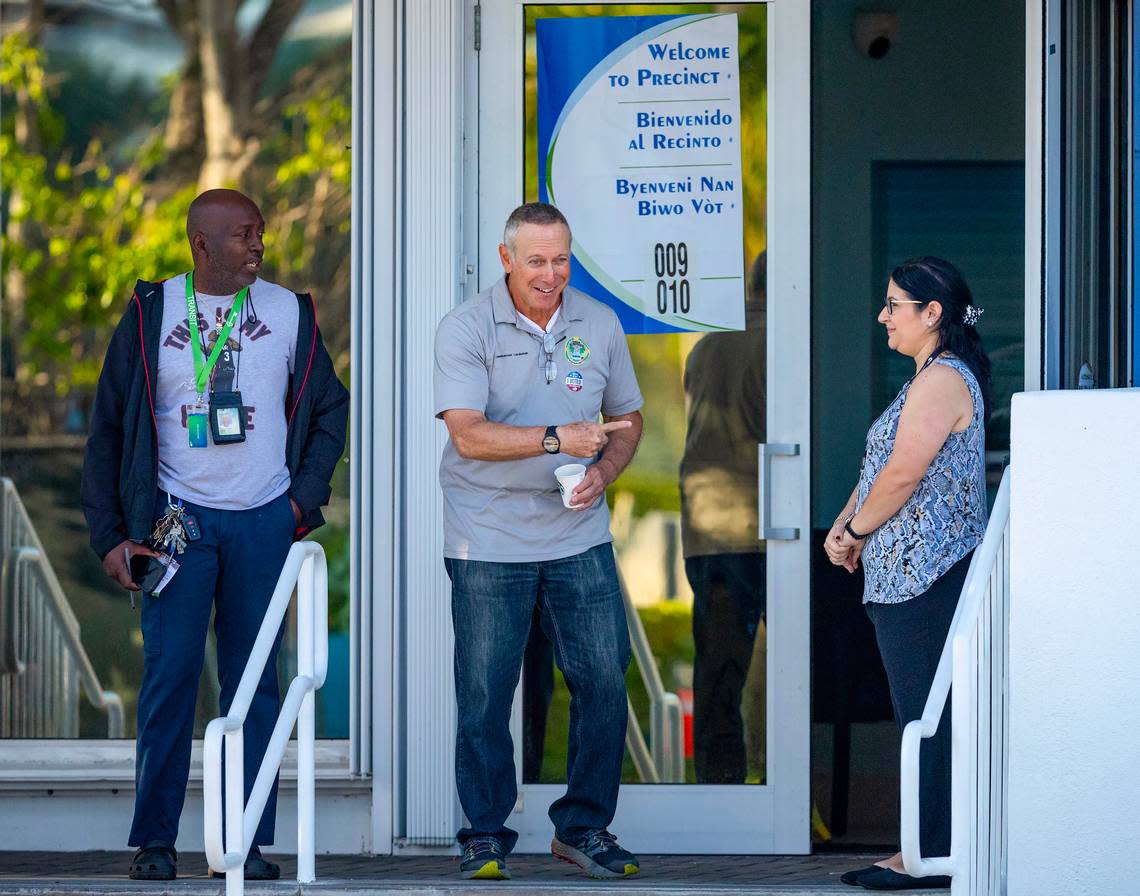Trump easily wins Florida Republican primary. But one in five vote for someone else
Florida Republicans mostly lined up behind Donald Trump in Tuesday’s primary election. But in a race with only token opposition, nearly 20% of them voted for someone else.
With no real competition, the former president won more than eight out of every 10 votes in the Sunshine State, coasting to victory in an election that served mostly as a symbolic demonstration of Trump’s support in his home state.
Six other Republican presidential candidates, including Florida Gov. Ron DeSantis, were also on the ballot, but all had dropped out long before polls opened on Tuesday. And Trump, a Floridian who voted for himself Tuesday in Palm Beach, secured the necessary delegates to clinch the GOP nomination last week.
But there are signs that the former president’s political strength isn’t what it once was.
In 2020 — when Trump was running as an incumbent president against three nominal candidates — he won about 94% of the vote in Miami-Dade County, a number that tracked with his statewide support, according to Florida elections records. This year, Trump received around 86% of the vote in Miami-Dade, and about 81% statewide.
Former United Nations Ambassador Nikki Haley, who dropped out of the race on March 6, finished second in Miami-Dade, with a little more than 10% of the vote. With votes still being tallied Tuesday night, Haley had slim leads in three precincts — all of them majority-white.
Trump’s biggest margins in Miami-Dade were in majority-Hispanic neighborhoods in and around Hialeah and Miami.

Florida trending red
Though Trump performed better in 2020, Justin Sayfie, a Republican lobbyist and advisor to former Florida Gov. Jeb Bush, said that the Republican turnout Tuesday night for Trump was significant because it shows just how dedicated Florida voters are to the former president. In the November general election, that matters, he said.
“Florida’s trended red in the last couple elections, but Barack Obama still won the state twice and Donald Trump won it twice,” Sayfie said. “Florida’s still a purple state.”
Less than a year ago, Trump’s victory in the Florida Republican primary wasn’t certain. DeSantis, a rising star within the GOP, was on the cusp of declaring a presidential bid, and many Republicans saw a real possibility that the Florida governor would unseat Trump as the leader of the modern GOP.
Instead, DeSantis dropped out after placing a distant second in Iowa, and earned less than 4% of the vote in Tuesday’s primary.
Now, Trump is virtually guaranteed to run in November against President Joe Biden, who effectively won Florida’s 224 delegates months ago when the state Democratic Party submitted only the president’s name for the ballot.
“Florida Democrats are proud to support President Biden and Vice-President Harris for another term in the White House, and we will continue to fight tooth and nail to help get them there — we can’t allow Donald Trump anywhere near the presidency ever again,” Nikki Fried, the chairwoman of the Florida Democratic Party, said in a statement.
But while the Republican presidential nomination was the big-ticket item on the ballot, voters in some parts of the state saw municipal races on the ballot. Early voting numbers showed Democratic turnout lagging far behind Republican turnout across the state. Experts suggested that the lack of a presidential primary may have something to do with that.
“For Florida [Democrats] in particular, they may have made a little bit of a strategic mistake by not allowing a primary, because that would have at least provided a little incentive for people to turn out,” said Aubrey Jewett, a political science professor at the University of Central Florida.






